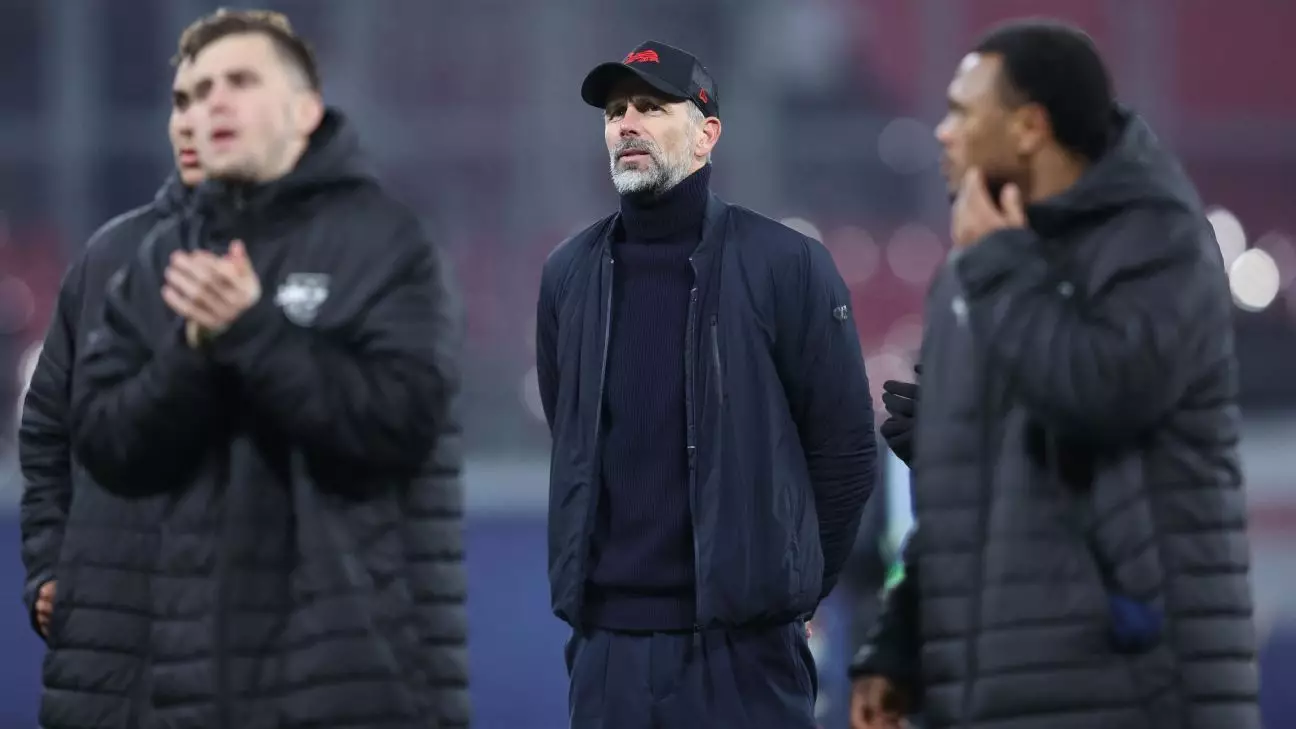In the realm of German football, the language we use to describe the game is richly symbolic, particularly when considering the verb “passen.” This term encapsulates the essence of alignment, suggesting that when a player or coach is said to fit a team—”zur Mannschaft passt”—it ignites a sense of jubilation among fans and club officials alike. The emphasis here is on synergy; a successful pairing does not merely happen but is celebrated as a triumph due to its rarity. The case of Marco Rose represents this phenomenon perfectly, as he embodies the balance between local understanding and professional adaptability that Leipzig sorely needed.
Marco Rose, the current head coach of RB Leipzig, has established himself as someone who seemingly embodies the club’s ethos. A native of Leipzig, Rose not only understands the Red Bull philosophy but has also honed his coaching skills at RB Salzburg, contributing to his tactical acumen. Unlike many of his predecessors, who often adhered strictly to tactical principles, Rose incorporates a flexible approach. He utilizes concepts such as Gegenpressing and Umschaltfussball (transition football), but is also open to pragmatism based on the opponent and game context, which is a refreshing change in an era that often demands strict adherence to tactical dogma.
The timeline of Rose’s tenure—spanning 826 days—has placed him behind only Alexander Zorniger in terms of job security since RB Leipzig’s inception in 2009. This stability is remarkable, particularly given the club’s reactive nature when it comes to managerial changes. With individuals like Jesse Marsch and Domenico Tedesco falling victim to the pressure cooker atmosphere of high expectations, Rose’s continued presence reveals a successful navigation of both success and potential crises.
His leadership was showcased through Leipzig’s remarkable victories in domestic competitions, including the DFB-Pokal and the DFL-Supercup, particularly against Bundesliga giants Bayern Munich—a feat that reinforces the growing competitive spirit within the squad. Unfortunately, this success has been overshadowed recently by a severe downturn in performance in the UEFA Champions League. The group stage, which pitted them against formidable opponents like Atletico Madrid, Juventus, and Liverpool, resulted in a disheartening record of six losses out of six matches. This outcome not only exposes the vulnerabilities within the squad but also raises questions about Rose’s tactical effectiveness on the European stage.
In football, dire circumstances often force teams to reevaluate their progress, and for Leipzig, a recent DFB-Pokal quarterfinal against Eintracht Frankfurt emerged as a defining moment. With speculation surrounding Rose’s future, a loss would have intensified calls for change. However, Leipzig rose to the occasion, delivering a performance that temporarily quelled the discourse regarding the coach’s job security. The stellar displays from players like Loïs Openda and Benjamin Sesko showcased the team’s potential, but the underlying tensions regarding team performance remain relevant, especially with the Winterpause nearing.
The shifting dynamics at the top can be both a boon and a hindrance for any managerial regime. With names like Roger Schmidt—also tied to Red Bull in the past—floating about, and Erik ten Hag still esteemed despite his struggles at Manchester United, the pressure on Rose intensifies. There is an inherent risk for Leipzig, as the whispers of change could become louder if results do not improve, particularly with Jürgen Klopp set to take a larger role at Red Bull, which may complicate Rose’s situation further.
Despite their recent woes, RB Leipzig has a pathway forward, especially with the DFB-Pokal draw offering new opportunities for glory. As they anticipate continued successes, they must address the shortcomings revealed throughout their Champions League campaign. Moreover, the prospect of polemical matchups looms with Bayer Leverkusen—a formidable side that is rapidly gaining momentum. Their recent successes highlight the necessity for Leipzig to adopt a more innovative tactical approach.
Additionally, watching teams like St. Pauli, who have demonstrated resilience in overcoming challenges, serves as a reminder that adaptability is crucial. While the competition is fierce, especially with the likes of Bayer Leverkusen thriving under the strategic ingenuity of Xabi Alonso, Leipzig must embrace tactical experimentation and player development.
Ultimately, the blend of local heritage and tactical flexibility that Marco Rose brings to RB Leipzig may well serve as the foundation for future successes. Hence, while the current narrative may be filled with uncertainties, the potential for growth remains vast, offering a myriad of possibilities as they navigate the competitive landscape of German and European football.

